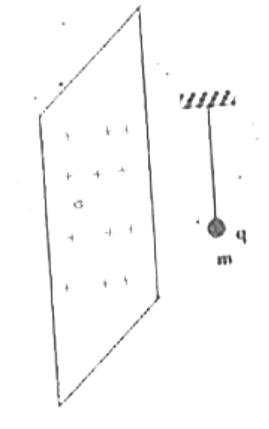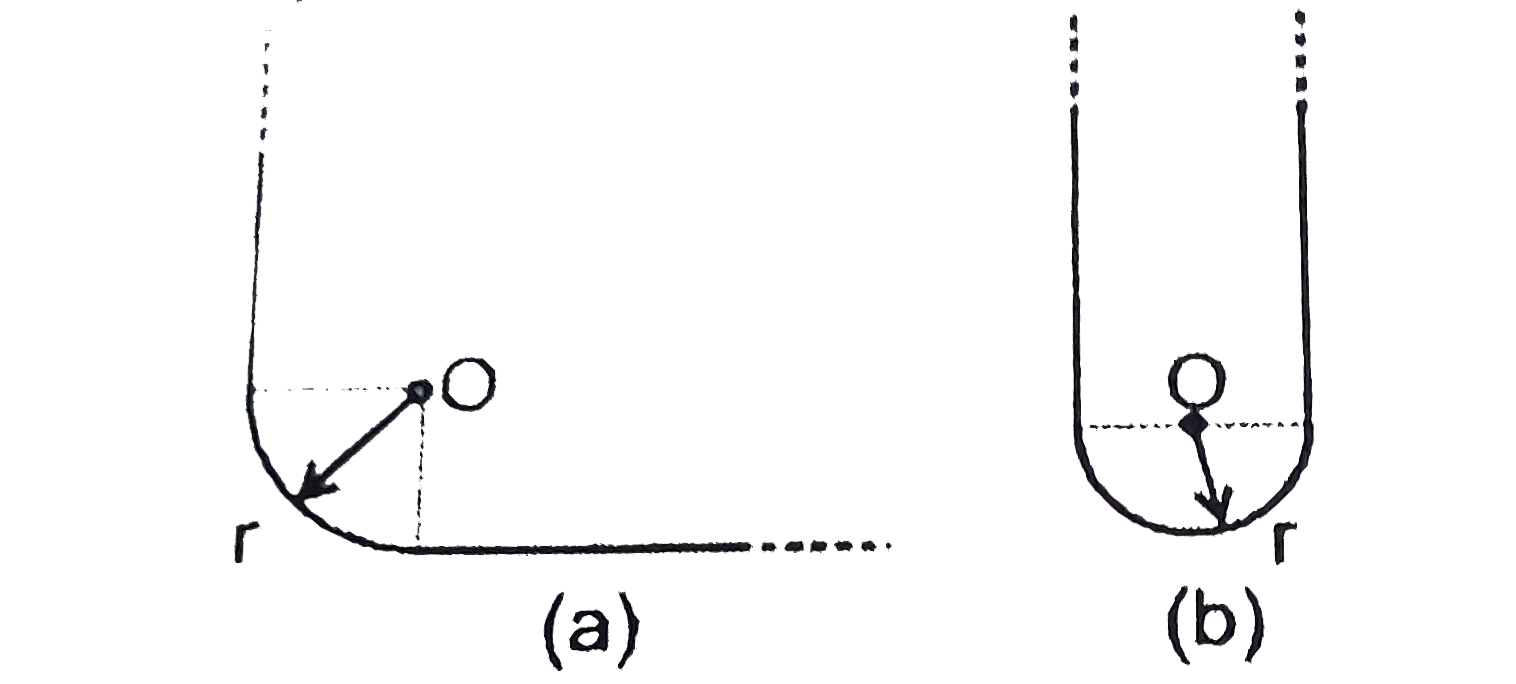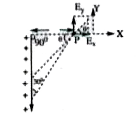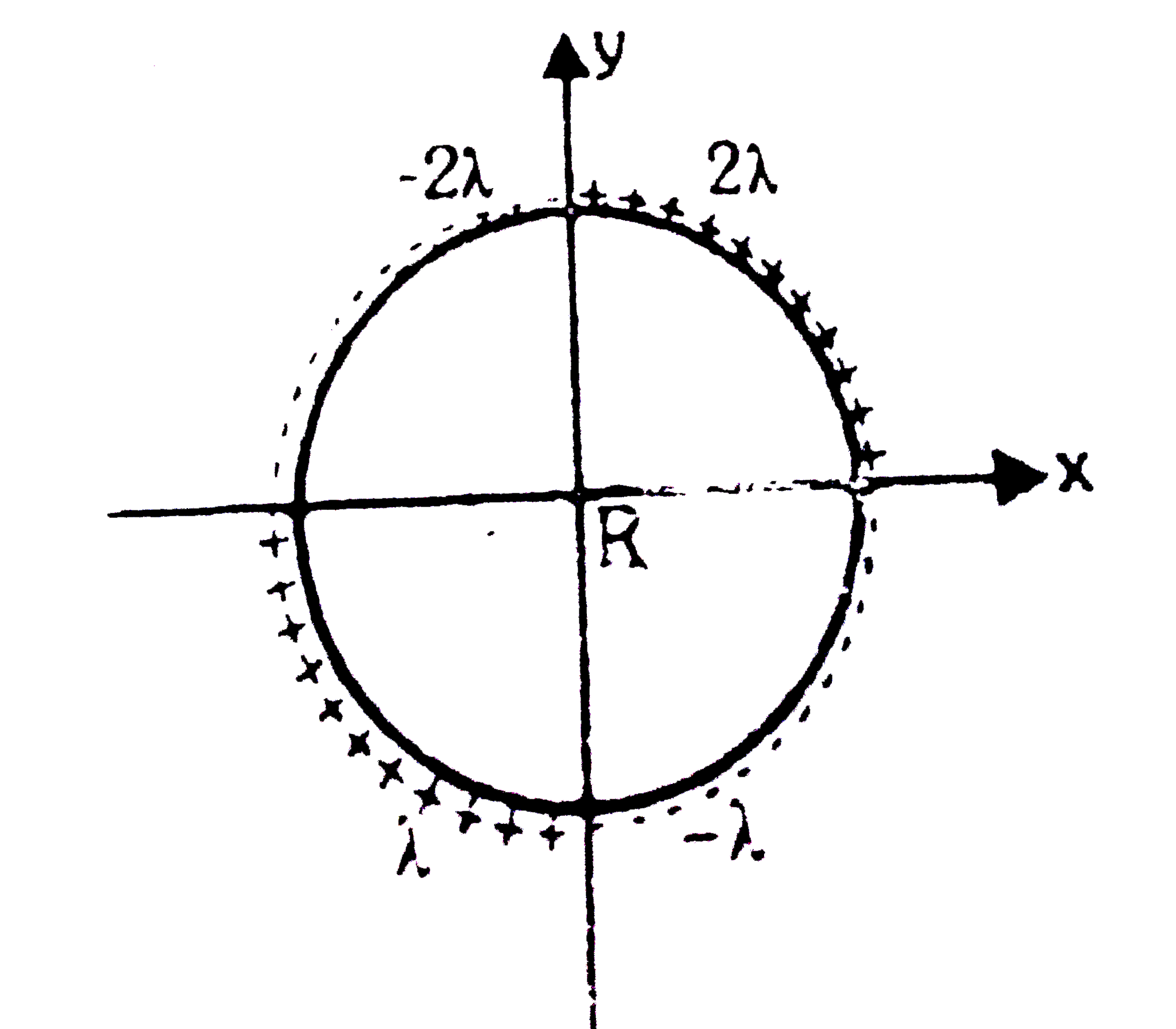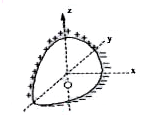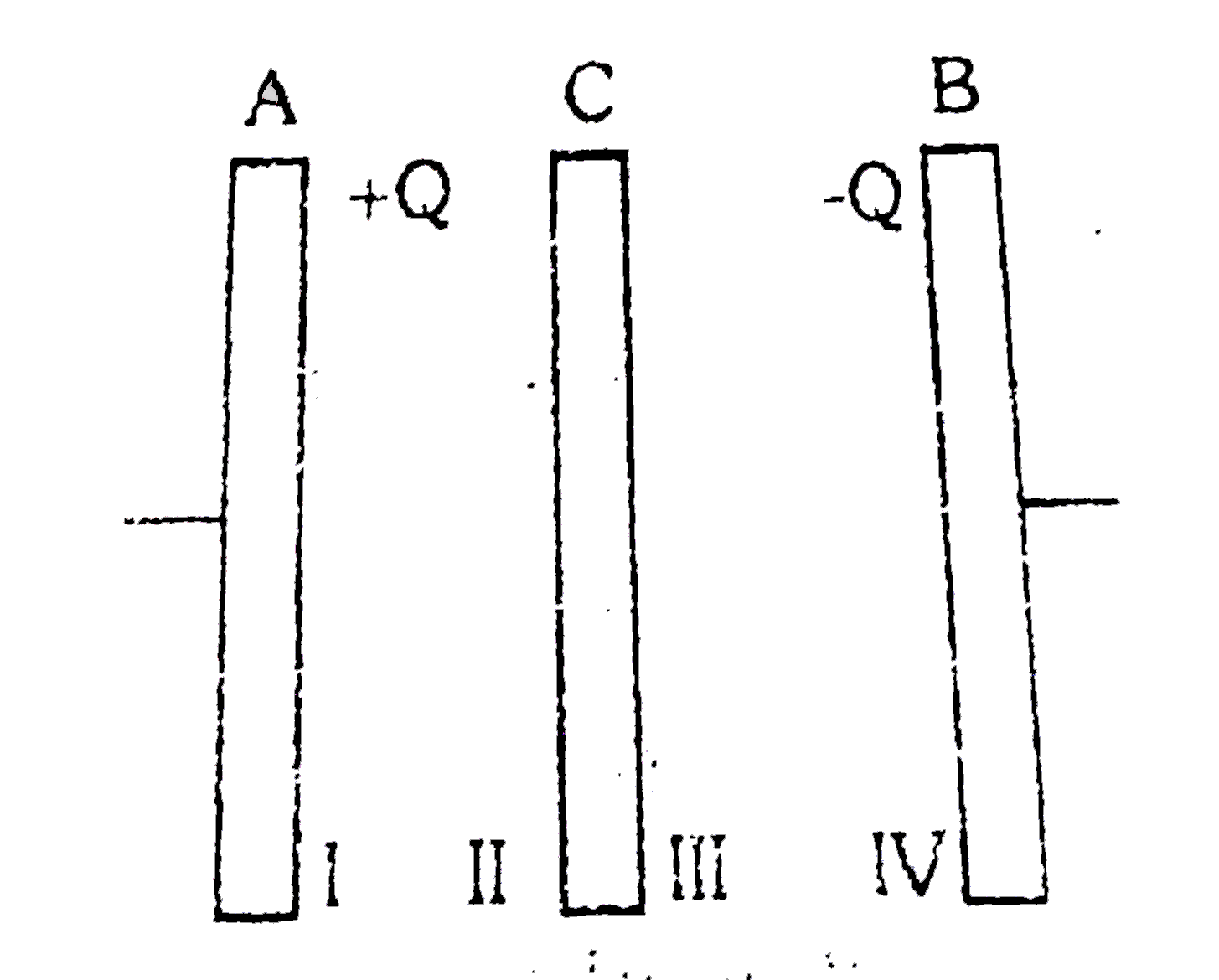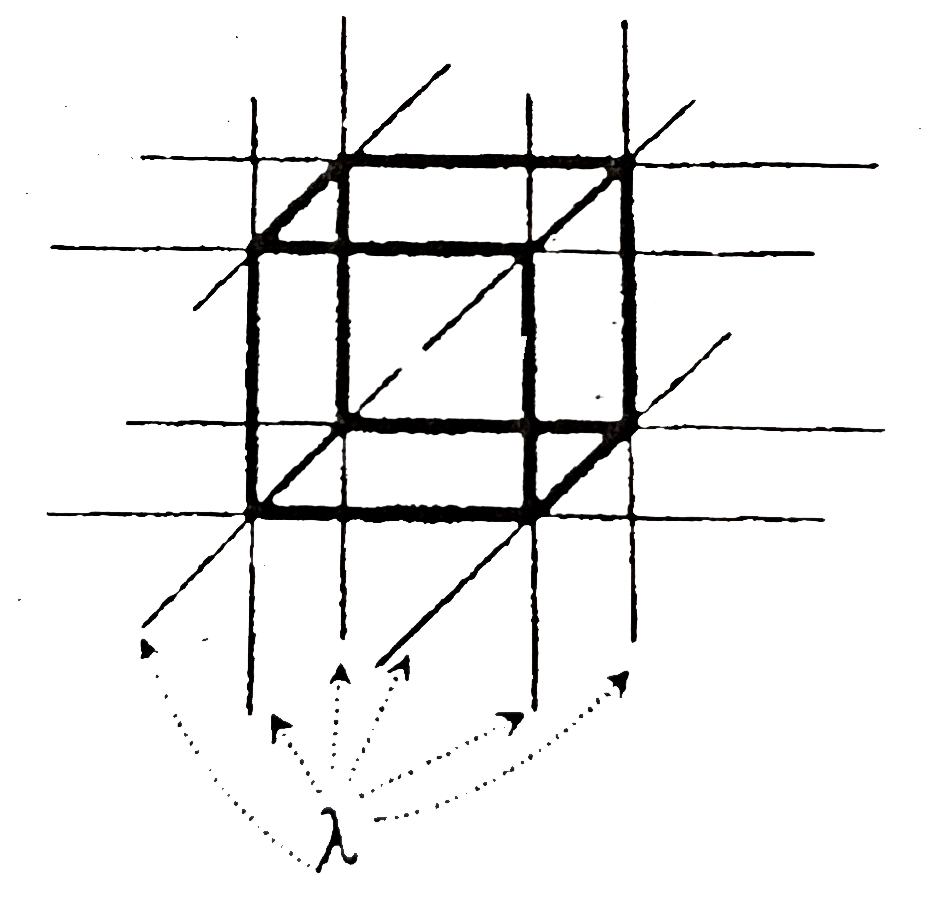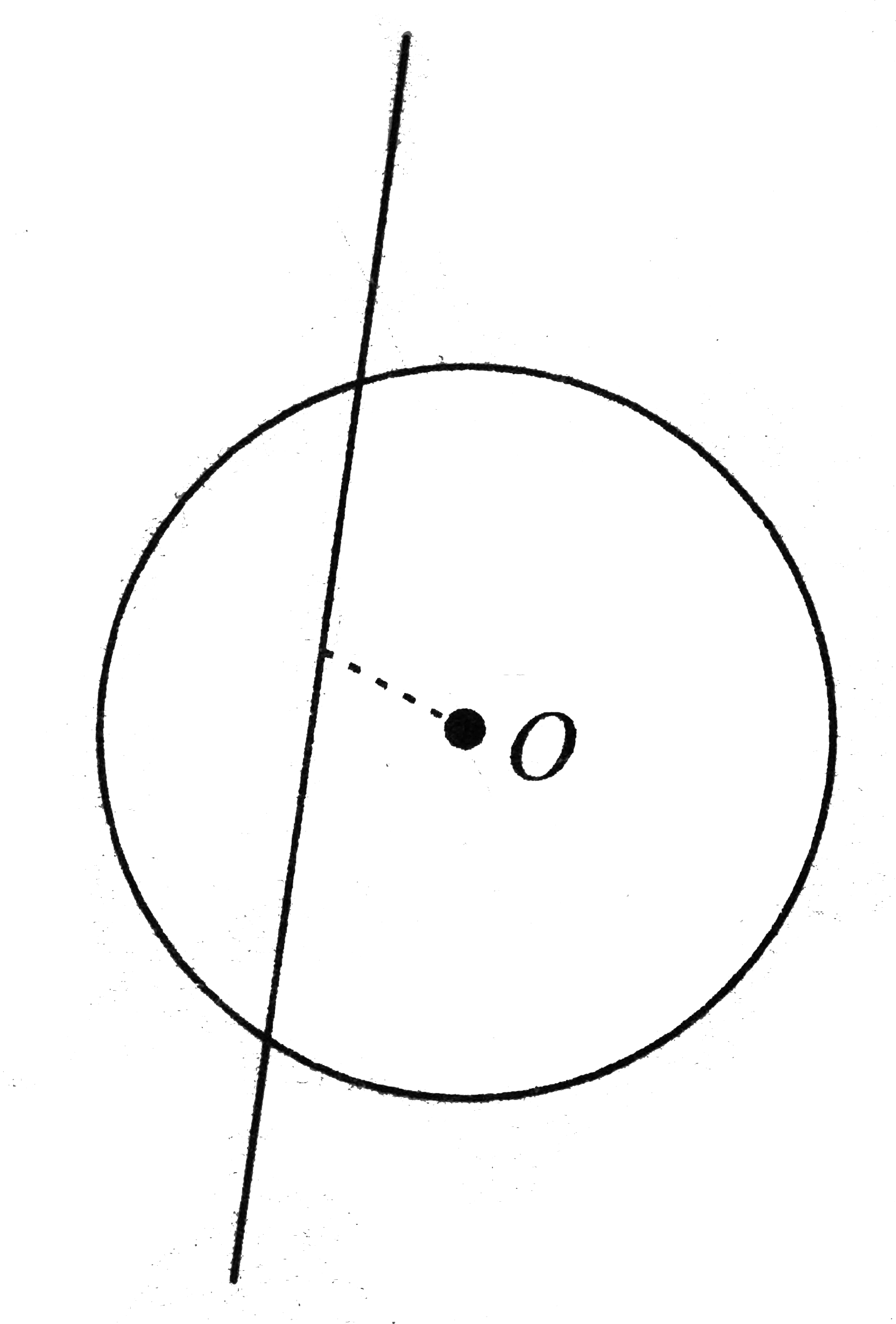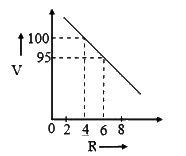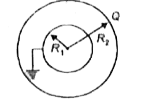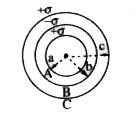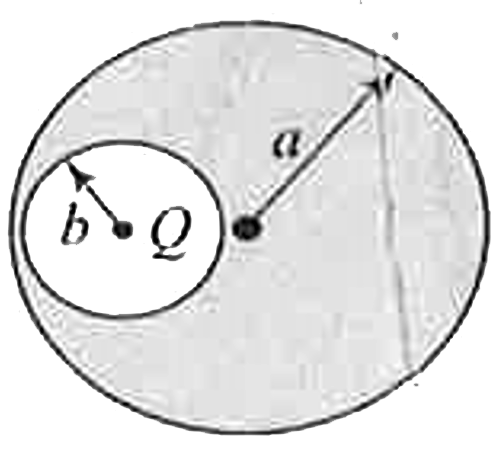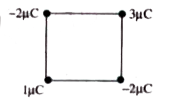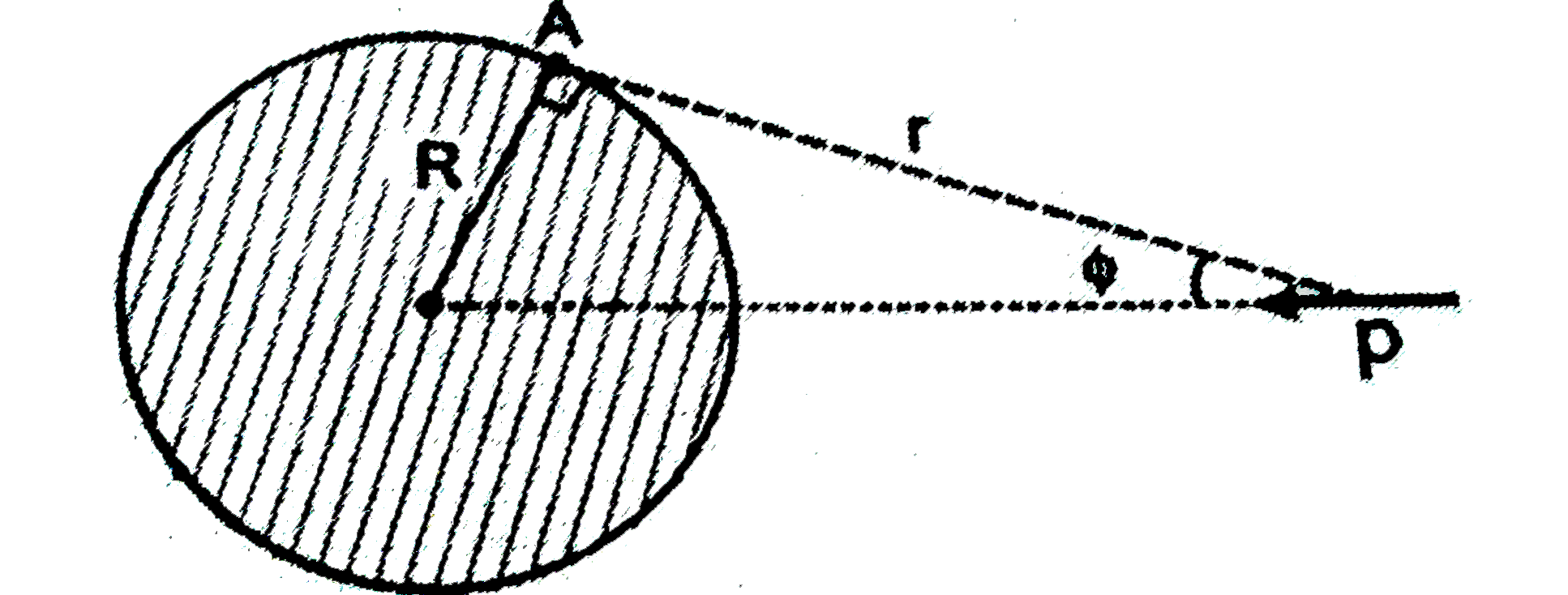PRACTICE SHEET (EXERCISE -V ELECTRIC DIPOLE) (LEVEL - I (MAIN) STRAIGHT OBJECTIVE TYPE QUESTIONS) from AAKASH SERIES ELECTROSTATICS for Class 12
| Class 12 | PHYSICS |
| Chapter | ELECTROSTATICS |
| AAKASH SERIES | PRACTICE SHEET (EXERCISE -V ELECTRIC DIPOLE) (LEVEL - I (MAIN) STRAIGHT OBJECTIVE TYPE QUESTIONS) |
| Medium | English |
| Academic Year | 2023-2024 |
Question 5
Two identical blocks of charge q each are connected by a massless spring of force constant k. They are placed over a smooth horizontal surface. They are released when the separation between them is r and spring is unstretched. If maximum extension of the spring is r, the value of k is (neglect gravitational effect)
 View Solution
View SolutionQuestion 10
One end of a 10 cm long silk thread is fixed to a large vertical surface of a charged non conducting plate and the other end is fastened to a small ball having a mass of 10 g and charge of 4.0×10C. In equilibrium, the thread make an angle of 600 with the vertical. Find the surface charge density on the plate.View SolutionQuestion 11
One end of a 10 cm long silk thread is fixed to a large vertical surface of a charged non-conducting plate and the other end is fastened to a small ball of mass 10 g and charge of 4×10−6C. In equilibrium, thread makes an angle of 60o with the vertical.
(a) Find the tension in the string in equilibrium.
(b) Suppose the ball is slightly pushed aside and released. Find the time period of the small oscillations.
(Use σ=7.5×10−7Cm2)View SolutionQuestion 12
One end of a 10 cm long silk thread is fixed to a large vertical surface of a charged non-conducting plate and the other end is fastened to a small ball of mass 10 g and charge of 4×10−6C. In equilibrium, thread makes an angle of 60o with the vertical.
(a) Find the tension in the string in equilibrium.
(b) Suppose the ball is slightly pushed aside and released. Find the time period of the small oscillations.
(Use σ=7.5×10−7Cm2)View SolutionQuestion 37
A system consists of a thin charged wire ring of radius r and a very long uniformly charged wire oriented along the axis of the ring, with one of its ends coinciding with the center of the ring. The total charge on the ring is q. and he linear charge density on the straight wire is λ, The interaction force between the ring and the wire is View SolutionQuestion 42
Two spherical, nonconducting, and very thin shells of uniformly distributed positive charge Q and radius d are located a distance 10d from each other. A positive point charge q is placed inside one of the shells at a distance d/2 from the center, on the line connecting the centers of the two shells, as shown in the figure. What is the net force on the charge q ?
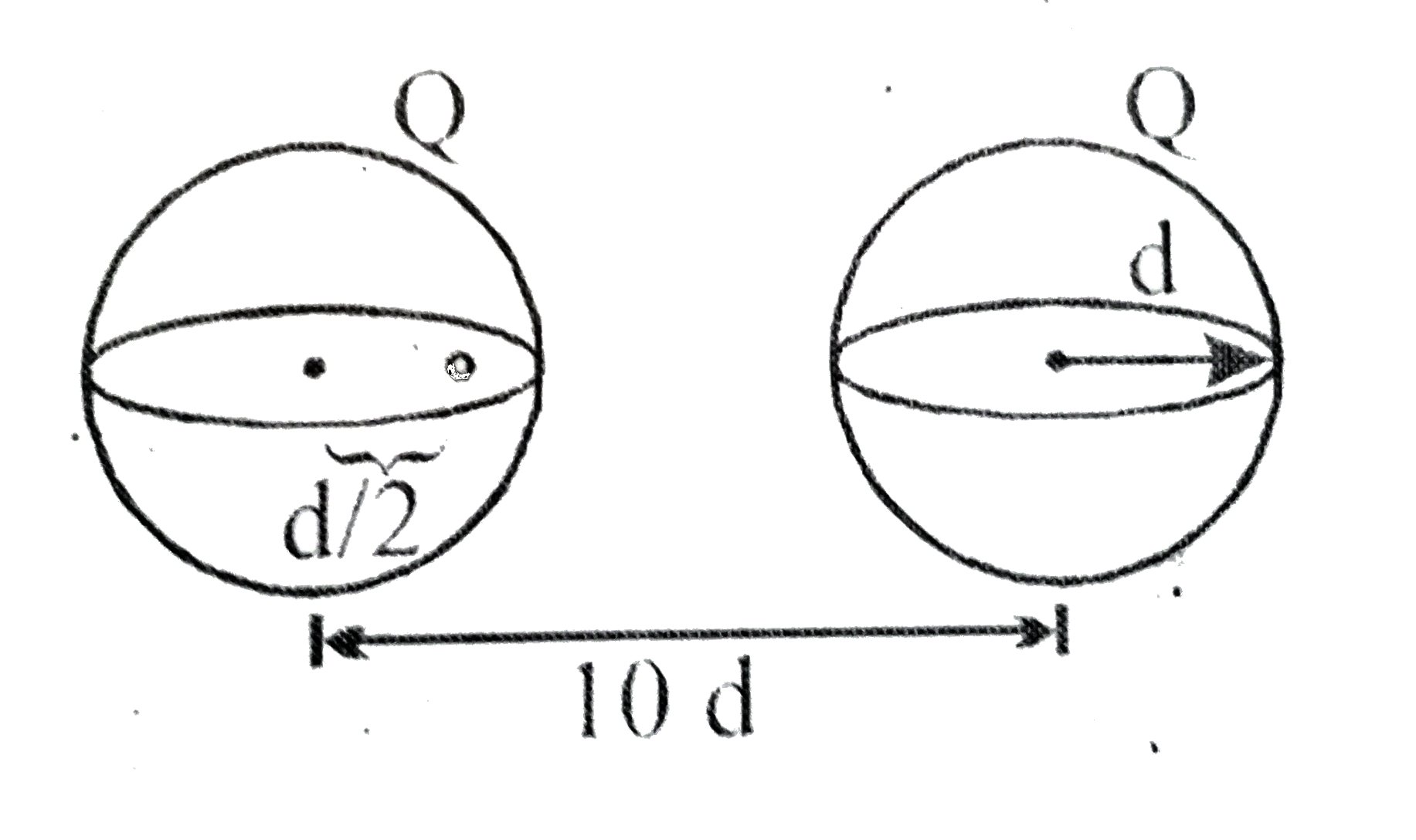 View Solution
View SolutionQuestion 44
Two large insulating plates having surface charge densities +σ and +σ are fixed at a distance d frome each other . A small test charge q of mass m is attached to two identical spring as show in the fingure . The charge q is now released from rest with springs in natural lenth . Then q will (Neglect gravity)
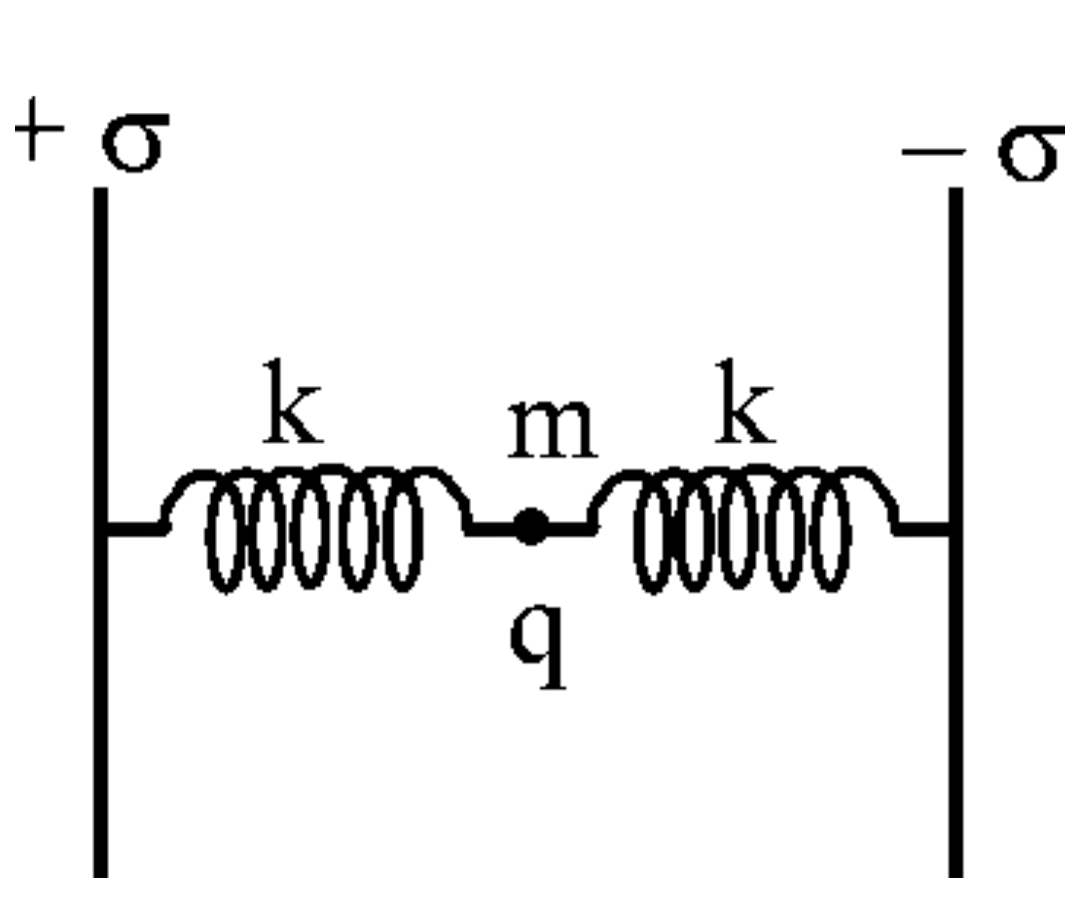 View Solution
View SolutionQuestion 45
A solid sphere of radius R has a charge +2Q. A hollow spherical concentric with the first sphere that has net charge -Q.
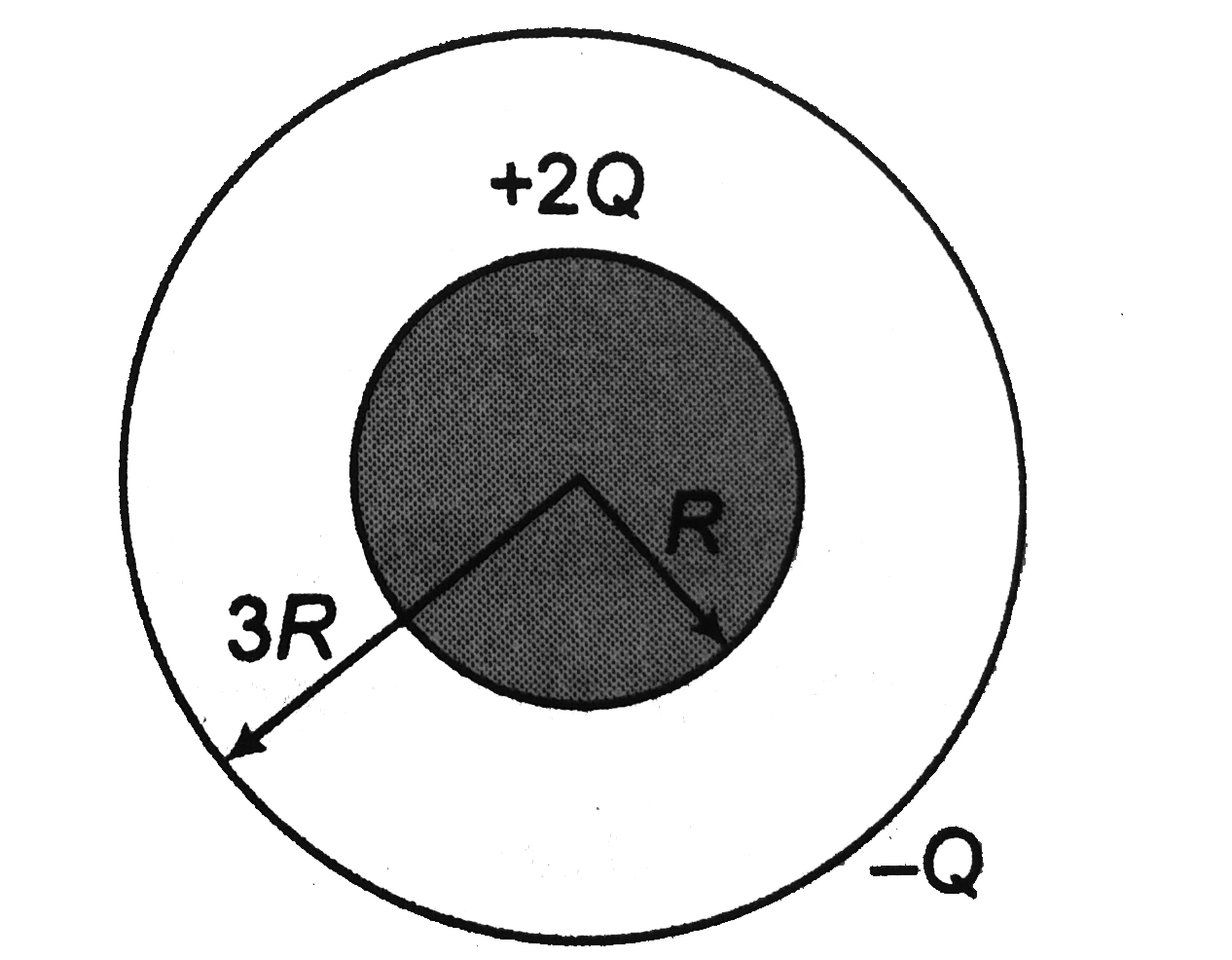
(a) Find the electric field between the spheres at a distance r from the centre of the inner sphere. [R<r<3R]
(b) Calculate the potential difference between the spheres.
(c) What would be the final distribution of charges, if a conducting wire joins the spheres?
(d) Instead of (c), if the inner sphere is earthed, what is the charge on it?View SolutionQuestion 58
A position charge q is placed at a distance of 4R above the centre of a disc of radius R. The magnitude of flux through the disc is ϕ. Now a hemispherical shell of radius R is placed over the disc such that it forms a closed surface. The flux through the curved surface (taking direction of area vector along outward normal as positive), is -
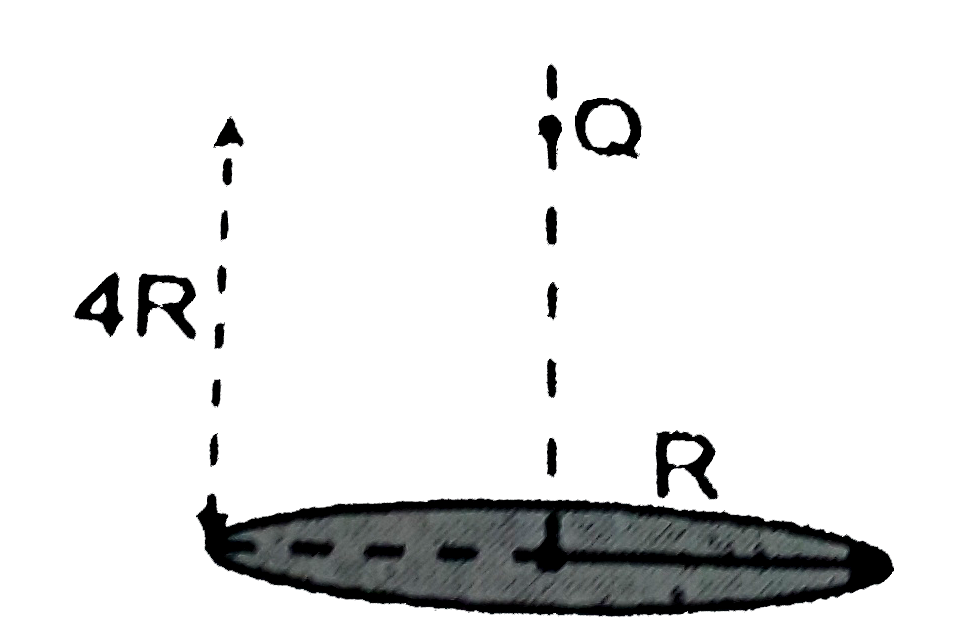 View Solution
View SolutionQuestion 61
Three identical metal plates with large surface areas are kept parallel to each as shown in figure (30-E8). The leftmost plate is given a charge Q, the rightmost a chrgear2Q and the middle one remains neutral. Find the charge appearing on the outer surface of the rightmost plate.
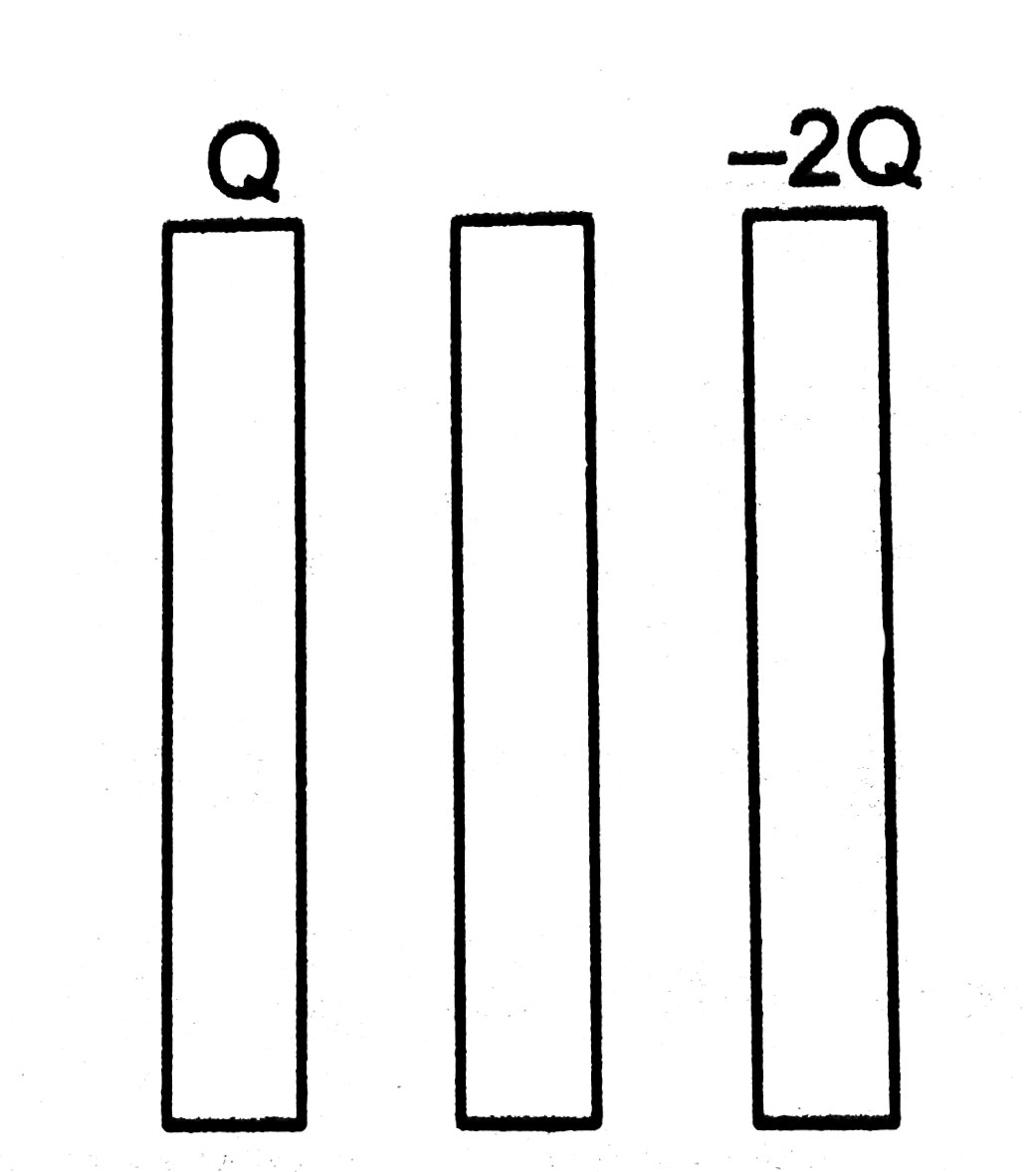 View Solution
View SolutionQuestion 71
A point charge .Q. is placed at a point inside the cone as shown. The flux due to the charge through the curved surface is given as 2Q3ε0. Now another charge .Q. is placed vertically above at the same distance from the base. The flux through the curved surface due to both charges is .
 View Solution
View SolutionQuestion 72
Two long parallel conducting horizontal rails are connected by a conducting wire at one end. A uniform magnetic field B (directed vertically downwards) exists in the region of space.
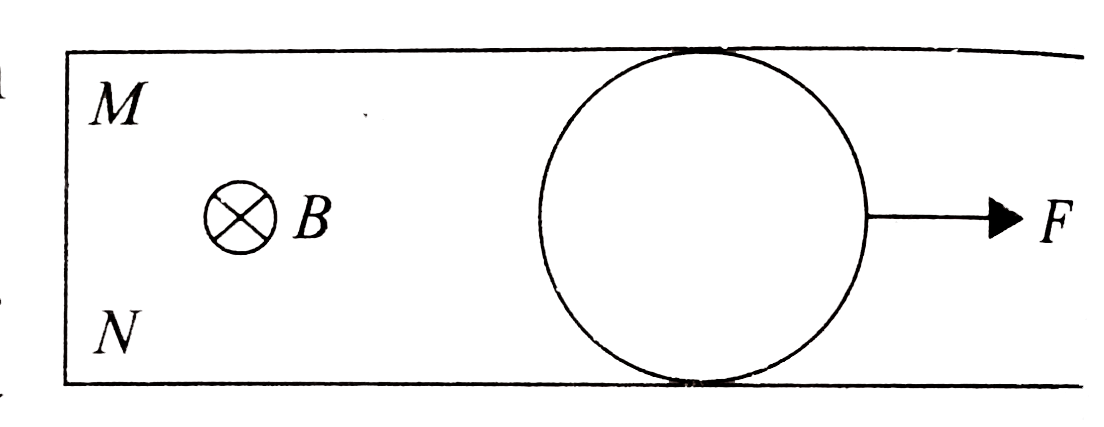
A light uniform ring of diameter d which is practically equal to separation between the rails is placed over the rails as shown in Fig. If resistance of ring be (λ) per unit length
The force required to pull the ring with uniform velocity v is View SolutionQuestion 77
Four initially uncharaged thin, large, plane idential metallic plates A,B,C and D are arranged parallel to each other as shown. Now plates A,B,C and D are given charges Q,2Q,3Q and 4Q respectively. Plates A and D are connected by a mtallic wire while plates B and C connected by other metallic wire then after Electrostatic equilibrium is reached.
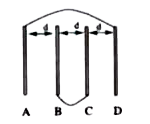
Total charge on plates after earthing plates A and B will be View SolutionQuestion 79
Four initially uncharaged thin, large, plane idential metallic plates A,B,C and D are arranged parallel to each other as shown. Now plates A,B,C and D are given charges Q,2Q,3Q and 4Q respectively. Plates A and D are connected by a mtallic wire while plates B and C connected by other metallic wire then after Electrostatic equilibrium is reached.

Total charge on plates after earthing plates A and B will be View SolutionQuestion 91
Three plates A, B and C are placed close to each other with +Q charge given to the middle plate. The inner surfaces to A and C can be connected to earth through plate D and keys K1 and K2 . The plates D is a dielectric slab with dielectric constant K1 then the charge that will flow through plate D and keys K1 and K2 . The plate D is a dielectric slab with dielectric constant K, then the charge that will flow though plate D when K2 is closed and K2 is open is
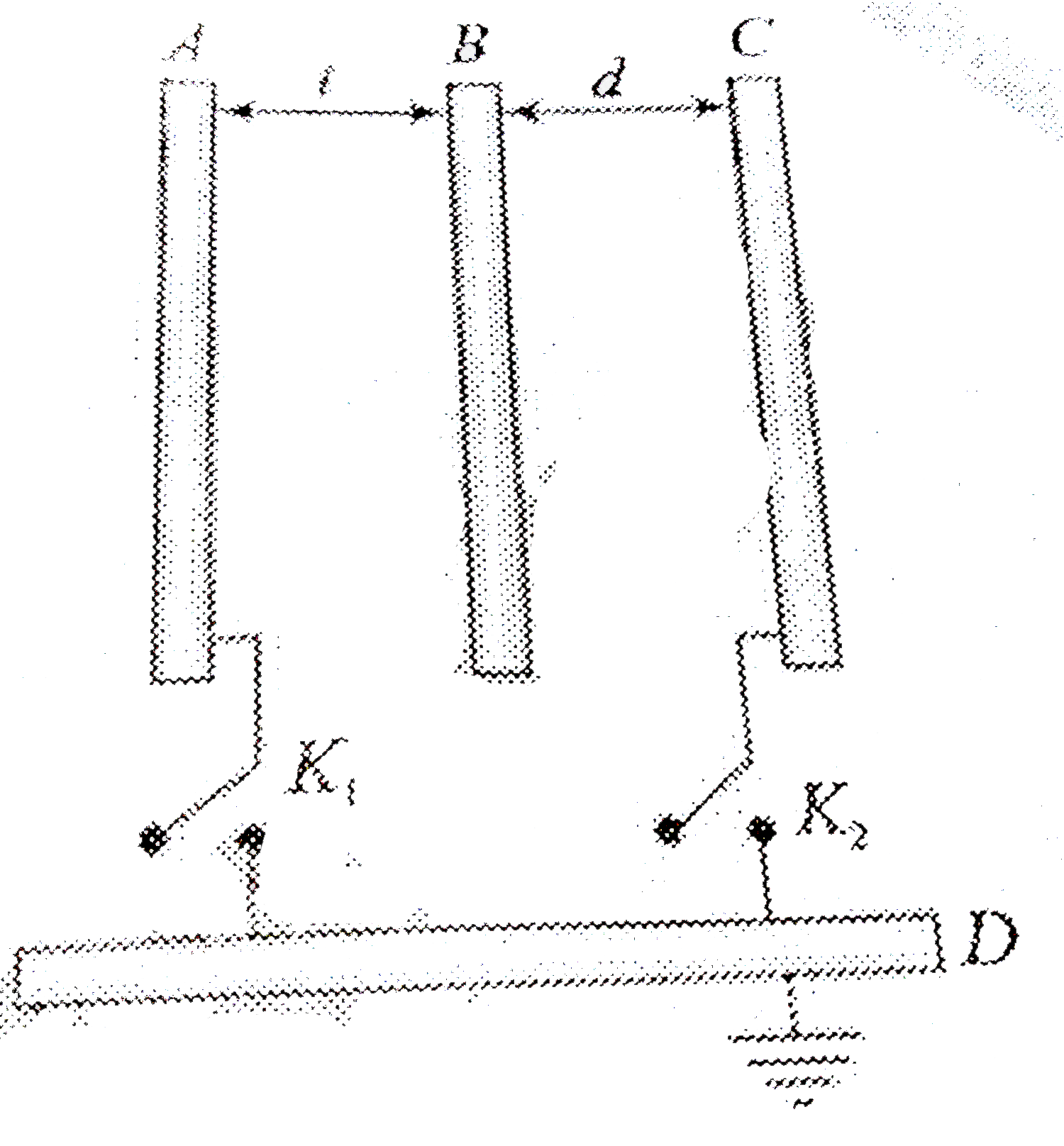 View Solution
View SolutionQuestion 92
As a charged particle 'q' moving with a velocity →v enters a uniform magnetic field →B, it experience a force →F=q(→v×→B).Forθ=0∘or180∘,θ being the angle between →vand→B, force experienced is zero and the particle passes undeflected. For θ=90∘, the particle moves along a circular arc and the magnetic force (qvB) provides the necessary centripetal force (mv2/r). For other values of θ(θ≠0∘,180∘,90∘), the charged particle moves along a helical path which is the resultant motion of simultaneous circular and translational motions.
Suppose a particle that carries a charge of magnitude q and has a mass 4×10−15 kg is moving in a region containing a uniform magnetic field →B=−0.4ˆkT. At some instant, velocity of the particle is →v=(8ˆi−6ˆj4ˆk)×106ms−1 and force acting on it has a magnitude 1.6 N
Angular frequency of rotation of particle, also called the cyclotron frequency' isView SolutionQuestion 95
Choose the correct alternatives.
(i) Acceleration due to gravity increases/decreases with increasing altitude.
(ii) Acceleration due to gravity increases/decreases with increasing depth (assume the earth to be a sphere of uniform density.
(iii) Acceleration due to gravity is independent of the mass of the earth/mass of the body.
(iv)The formula −GMm(1r2−1r1) is more/less accurate than the formula mg (r2−r1) for the difference of potential energy between two points r2 and r1 distance away from the centre of the earth. View SolutionQuestion 103
Consider two concentric conducting spheres. The outer sphere is hollow and initially has a charge −7Q on it. The inner sphere is solid and has a charge +2Q on it.
a. How much charge is on the outer surface and inner surface of the outer sphere.
b. If a wire is connected between the inner and outer sphere, after electrostatic equilibrium is established how much total charge is on the outer sphere? How much charge is on the outer surface and inner surface of the outer sphere? Does the electric field at the surface of the inside sphere change when the wire is connected?
c. We return to original condition in (a). We now connect the outer sphere to ground with a wire and then disconnect it. How much total charge will be on the outer sphere? How much charge will be on the inner surface and outer surface of the outer sphere? View SolutionQuestion 109
At y = 1 cm, y = 3 cm y = 9 cm, y = 27 cm … and so on , an infinite number of charges equal to 5C are placed. At x = 1 cm, x = 2 cm, x = 4 cm, x = 8 cm …. And so on, an infinite number of charges equal to - 5C are placed. Find the electirc potential at origin is volts . (K=14πε0) View SolutionQuestion 130
A conducting sphere of radius b has a spherical cavity with its centre displaced by 'a' from centre of sphere O1. A point charged q is placed at the centre of cavity O2. Q charge is given to conducting sphere and charge q0 is placed at P, a distance c from centre O1. Further O1,O2 and P are collinear
 View Solution
View SolutionQuestion 131
If a charge is moving towards the centre of an earthed conducting sphere of radius b with uniform velocity v. Distance of two points A and B from centre of sphere are 3a & 2a. Conducting sphere is earthed with an ammeter and resistance in series (as shown)
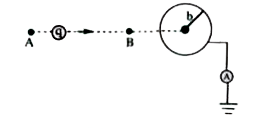
Net charge on surface of conductor at this instantView SolutionQuestion 132
If a charge is moving towards the centre of an earthed conducting sphere of radius b with uniform velocity v. Distance of two points A and B from centre of sphere are 3a & 2a. Conducting sphere is earthed with an ammeter and resistance in series (as shown)

Net charge on surface of conductor at this instantView SolutionQuestion 133
If a charge is moving towards the centre of an earthed conducting sphere of radius b with uniform velocity v. Distance of two points A and B from centre of sphere are 3a & 2a. Conducting sphere is earthed with an ammeter and resistance in series (as shown)

Net charge on surface of conductor at this instantView SolutionQuestion 134
Column I gives certain situations involving two thin conducting shells connected by a conducting wire via a key K. In all situations, one sphere has net charge +q and other sphere has not net charge. After the key K is pressed, column II gives some resulting effects. Match the figures in Column I with the statement in Column II.
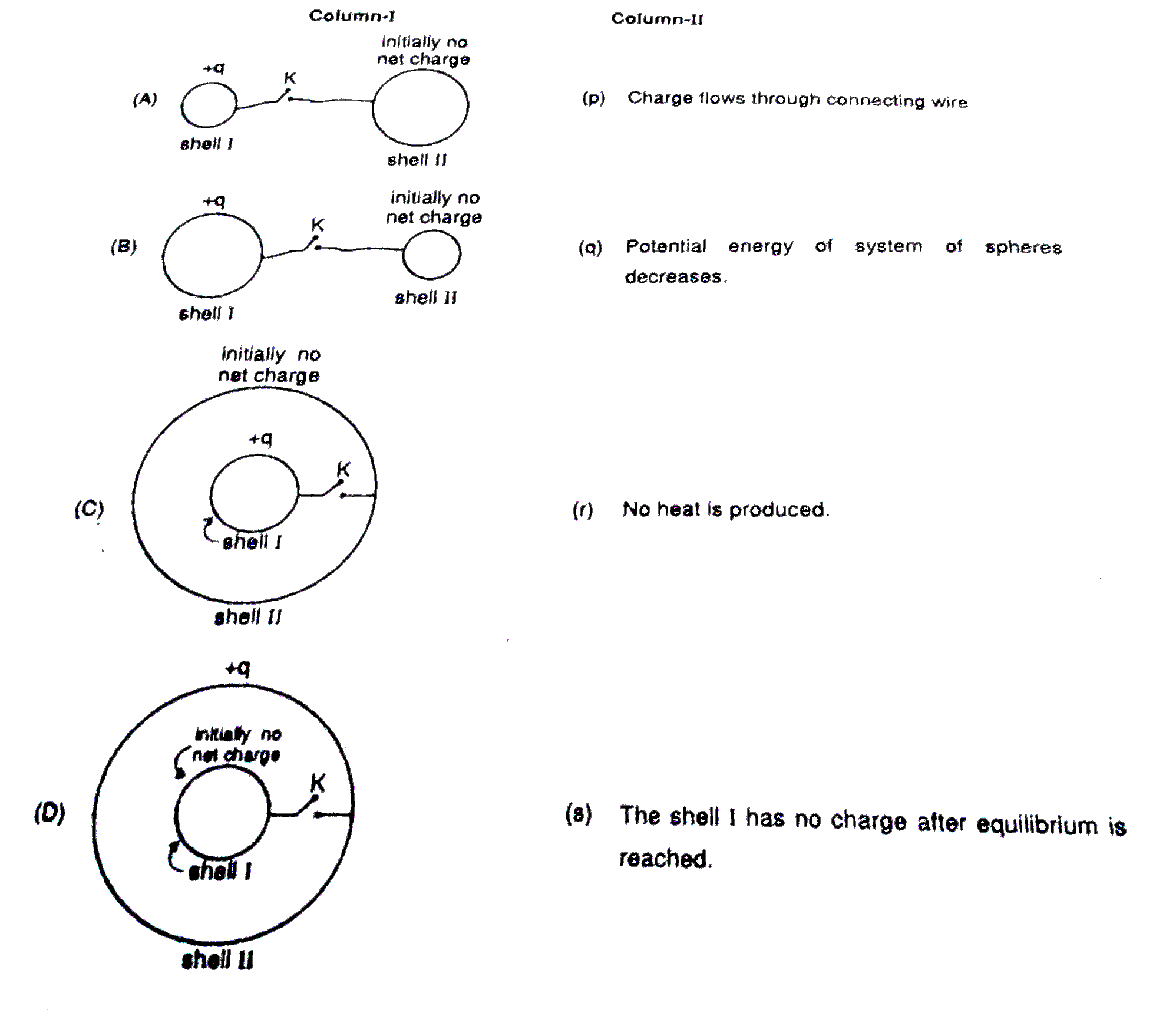 View Solution
View SolutionQuestion 146
Fig. shows a ball having a charge q fixed at a point A. Two identical balls of mass m having charge +qand−q are attaached to the end of a light rod of length 2a. The system is released from the situation shown in fig. Find the angular velocity of the rod when the rod turns through 90∘
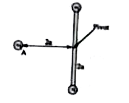 View Solution
View SolutionQuestion 148
A small, electrically charged bead can slide on a circular, frictioless, insulating rod. A point - like electric dipole (→P) is fixed at the centre of the circle with the dipole.s axis lying in the plane of the circle. Intially the bead is on the plane of symmetry of the dipole, as shown in the figure. The bead is slightly displaced along ring, tangentially with intial speed very close to zero. (Ignore the effect of gravity, assuming that the electric forces are much greater than the gravitational ones).
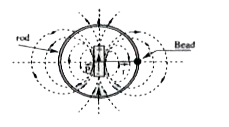
The normal force exerted by rod on the bead is (q = angle between an radius vector of bead, (considering dipole as origin)View SolutionQuestion 149
A small, electrically charged bead can slide on a circular, frictioless, insulating rod. A point - like electric dipole (→P) is fixed at the centre of the circle with the dipole.s axis lying in the plane of the circle. Intially the bead is on the plane of symmetry of the dipole, as shown in the figure. The bead is slightly displaced along ring, tangentially with intial speed very close to zero. (Ignore the effect of gravity, assuming that the electric forces are much greater than the gravitational ones).

The normal force exerted by rod on the bead is (q = angle between an radius vector of bead, (considering dipole as origin)View Solution
All Exercises from AAKASH SERIES Class 12 PHYSICS ELECTROSTATICS
- LECTURE SHEET (EXERCISE - I) (LEVEL - I (MAIN ) STRAIGHT OBJECTIVE TYPE QUESTIONS)
- LECTURE SHEET (EXERCISE - I) (LEVEL - II (ADANCED) INTEGER TYPE QUESTIONS)
- LECTURE SHEET (EXERCISE - I) (LEVEL - II (ADVANCED ) MORE THAN ONE CORRECT ANSWER TYPE QUESTIONS)
- LECTURE SHEET (EXERCISE - I) (LEVEL - II (ADVANCED ) STRAIGHT OBJECTIVE TYPE QUESTIONS)
- LECTURE SHEET (EXERCISE - II) (LEVEL - I (MAIN ) STRAIGHT OBJECTIVE TYPE QUESTIONS)
- LECTURE SHEET (EXERCISE - II) (LEVEL - II (ADVANCED) INTEGER TYPE QUESTIONS)
- LECTURE SHEET (EXERCISE - II) (LEVEL - II (ADVANCED) MORE THAN ONE CORRECT ANSWER TYPE QUESTIONS)
- LECTURE SHEET (EXERCISE - II) (LEVEL - II (ADVANCED)LINKED COMP[REHENSION TYPE QUESTIONS)
- LECTURE SHEET (EXERCISE - III) (LEVEL - I (MAIN) STRAIGHT OBJECTIVE TYPE QUESTIONS)
- LECTURE SHEET (EXERCISE - III) (LEVEL - II (ADVANCED) INTEGER TYPE QUESTIONS)
- LECTURE SHEET (EXERCISE - III) (LEVEL - II (ADVANCED) LINKED COMPREHENSION TYPE QUESTIONS)
- LECTURE SHEET (EXERCISE - III) (LEVEL - II (ADVANCED) MATRIX MATCHING TYPE QUESTIONS)
- LECTURE SHEET (EXERCISE - III) (LEVEL - II (ADVANCED) MORE THAN ONE CORRECT ANSWER TYPE QUESTIONS)
- LECTURE SHEET (EXERCISE - III) (LEVEL - II (ADVANCED) STRAIGHT OBJECTIVE TYPE QUESTIONS)
- LECTURE SHEET (EXERCISE - IV) (LEVEL - I (MAIN) STRAIGHT OBJECTIVE TYPE QUESTIONS)
- LECTURE SHEET (EXERCISE - IV) (LEVEL - II (ADVANCED) INTEGER TYPE QUESTIONS)
- LECTURE SHEET (EXERCISE - IV) (LEVEL - II (ADVANCED) LINKED COMPREHENSION TYPE QUESTIONS)
- LECTURE SHEET (EXERCISE - IV) (LEVEL - II (ADVANCED) MATRIX MATCHING TYPE QUESTIONS)
- LECTURE SHEET (EXERCISE - IV) (LEVEL - II (ADVANCED) MORE THAN ONE CORRECT ANSWER TYPE QUESTIONS)
- LECTURE SHEET (EXERCISE - IV) (LEVEL - II (ADVANCED) STRAIGHT OBJECTIVE TYPE QUESTIONS)
- LECTURE SHEET (EXERCISE - V) (LEVEL - I (MAIN) STRAIGHT OBJECTIVE TYPE QUESTIONS)
- LECTURE SHEET (EXERCISE - V) (LEVEL - II (ADVANCED) INTEGER TYPE QUESTIONS)
- LECTURE SHEET (EXERCISE - V) (LEVEL - II (ADVANCED) LINKED COMPREHENSION TYPE QUESTIONS)
- LECTURE SHEET (EXERCISE - V) (LEVEL - II (ADVANCED) MATRIX MATCHING TYPE QUESTIONS)
- LECTURE SHEET (EXERCISE - V) (LEVEL - II (ADVANCED) MORE THAN ONE CORRECT ANSWER TYPE QUESTIONS)
- LECTURE SHEET (EXERCISE - I) (LEVEL - I (MAIN ) STRAIGHT OBJECTIVE TYPE QUESTIONS)
- LECTURE SHEET (EXERCISE - I) (LEVEL - II (ADANCED) INTEGER TYPE QUESTIONS)
- LECTURE SHEET (EXERCISE - I) (LEVEL - II (ADVANCED ) MORE THAN ONE CORRECT ANSWER TYPE QUESTIONS)
- LECTURE SHEET (EXERCISE - I) (LEVEL - II (ADVANCED ) STRAIGHT OBJECTIVE TYPE QUESTIONS)
- LECTURE SHEET (EXERCISE - II) (LEVEL - I (MAIN ) STRAIGHT OBJECTIVE TYPE QUESTIONS)
- LECTURE SHEET (EXERCISE - II) (LEVEL - II (ADVANCED) INTEGER TYPE QUESTIONS)
- LECTURE SHEET (EXERCISE - II) (LEVEL - II (ADVANCED) MORE THAN ONE CORRECT ANSWER TYPE QUESTIONS)
- LECTURE SHEET (EXERCISE - II) (LEVEL - II (ADVANCED)LINKED COMP[REHENSION TYPE QUESTIONS)
- LECTURE SHEET (EXERCISE - III) (LEVEL - I (MAIN) STRAIGHT OBJECTIVE TYPE QUESTIONS)
- LECTURE SHEET (EXERCISE - III) (LEVEL - II (ADVANCED) INTEGER TYPE QUESTIONS)
- LECTURE SHEET (EXERCISE - III) (LEVEL - II (ADVANCED) LINKED COMPREHENSION TYPE QUESTIONS)
- LECTURE SHEET (EXERCISE - III) (LEVEL - II (ADVANCED) MATRIX MATCHING TYPE QUESTIONS)
- LECTURE SHEET (EXERCISE - III) (LEVEL - II (ADVANCED) MORE THAN ONE CORRECT ANSWER TYPE QUESTIONS)
- LECTURE SHEET (EXERCISE - III) (LEVEL - II (ADVANCED) STRAIGHT OBJECTIVE TYPE QUESTIONS)
- LECTURE SHEET (EXERCISE - IV) (LEVEL - I (MAIN) STRAIGHT OBJECTIVE TYPE QUESTIONS)
- LECTURE SHEET (EXERCISE - IV) (LEVEL - II (ADVANCED) INTEGER TYPE QUESTIONS)
- LECTURE SHEET (EXERCISE - IV) (LEVEL - II (ADVANCED) LINKED COMPREHENSION TYPE QUESTIONS)
- LECTURE SHEET (EXERCISE - IV) (LEVEL - II (ADVANCED) MATRIX MATCHING TYPE QUESTIONS)
- LECTURE SHEET (EXERCISE - IV) (LEVEL - II (ADVANCED) MORE THAN ONE CORRECT ANSWER TYPE QUESTIONS)
- LECTURE SHEET (EXERCISE - IV) (LEVEL - II (ADVANCED) STRAIGHT OBJECTIVE TYPE QUESTIONS)
- LECTURE SHEET (EXERCISE - V) (LEVEL - I (MAIN) STRAIGHT OBJECTIVE TYPE QUESTIONS)
- LECTURE SHEET (EXERCISE - V) (LEVEL - II (ADVANCED) INTEGER TYPE QUESTIONS)
- LECTURE SHEET (EXERCISE - V) (LEVEL - II (ADVANCED) LINKED COMPREHENSION TYPE QUESTIONS)
- LECTURE SHEET (EXERCISE - V) (LEVEL - II (ADVANCED) MATRIX MATCHING TYPE QUESTIONS)
- LECTURE SHEET (EXERCISE - V) (LEVEL - II (ADVANCED) MORE THAN ONE CORRECT ANSWER TYPE QUESTIONS)
- LECTURE SHEET (EXERCISE - I) (LEVEL - I (MAIN ) STRAIGHT OBJECTIVE TYPE QUESTIONS)
- LECTURE SHEET (EXERCISE - I) (LEVEL - II (ADANCED) INTEGER TYPE QUESTIONS)
- LECTURE SHEET (EXERCISE - I) (LEVEL - II (ADVANCED ) MORE THAN ONE CORRECT ANSWER TYPE QUESTIONS)
- LECTURE SHEET (EXERCISE - I) (LEVEL - II (ADVANCED ) STRAIGHT OBJECTIVE TYPE QUESTIONS)
- LECTURE SHEET (EXERCISE - II) (LEVEL - I (MAIN ) STRAIGHT OBJECTIVE TYPE QUESTIONS)
- LECTURE SHEET (EXERCISE - II) (LEVEL - II (ADVANCED) INTEGER TYPE QUESTIONS)
- LECTURE SHEET (EXERCISE - II) (LEVEL - II (ADVANCED) MORE THAN ONE CORRECT ANSWER TYPE QUESTIONS)
- LECTURE SHEET (EXERCISE - II) (LEVEL - II (ADVANCED)LINKED COMP[REHENSION TYPE QUESTIONS)
- LECTURE SHEET (EXERCISE - III) (LEVEL - I (MAIN) STRAIGHT OBJECTIVE TYPE QUESTIONS)
- LECTURE SHEET (EXERCISE - III) (LEVEL - II (ADVANCED) INTEGER TYPE QUESTIONS)
- LECTURE SHEET (EXERCISE - III) (LEVEL - II (ADVANCED) LINKED COMPREHENSION TYPE QUESTIONS)
- LECTURE SHEET (EXERCISE - III) (LEVEL - II (ADVANCED) MATRIX MATCHING TYPE QUESTIONS)
- LECTURE SHEET (EXERCISE - III) (LEVEL - II (ADVANCED) MORE THAN ONE CORRECT ANSWER TYPE QUESTIONS)
- LECTURE SHEET (EXERCISE - III) (LEVEL - II (ADVANCED) STRAIGHT OBJECTIVE TYPE QUESTIONS)
- LECTURE SHEET (EXERCISE - IV) (LEVEL - I (MAIN) STRAIGHT OBJECTIVE TYPE QUESTIONS)
- LECTURE SHEET (EXERCISE - IV) (LEVEL - II (ADVANCED) INTEGER TYPE QUESTIONS)
- LECTURE SHEET (EXERCISE - IV) (LEVEL - II (ADVANCED) LINKED COMPREHENSION TYPE QUESTIONS)
- LECTURE SHEET (EXERCISE - IV) (LEVEL - II (ADVANCED) MATRIX MATCHING TYPE QUESTIONS)
- LECTURE SHEET (EXERCISE - IV) (LEVEL - II (ADVANCED) MORE THAN ONE CORRECT ANSWER TYPE QUESTIONS)
- LECTURE SHEET (EXERCISE - IV) (LEVEL - II (ADVANCED) STRAIGHT OBJECTIVE TYPE QUESTIONS)
- LECTURE SHEET (EXERCISE - V) (LEVEL - I (MAIN) STRAIGHT OBJECTIVE TYPE QUESTIONS)
- LECTURE SHEET (EXERCISE - V) (LEVEL - II (ADVANCED) INTEGER TYPE QUESTIONS)
- LECTURE SHEET (EXERCISE - V) (LEVEL - II (ADVANCED) LINKED COMPREHENSION TYPE QUESTIONS)
- LECTURE SHEET (EXERCISE - V) (LEVEL - II (ADVANCED) MATRIX MATCHING TYPE QUESTIONS)
- LECTURE SHEET (EXERCISE - V) (LEVEL - II (ADVANCED) MORE THAN ONE CORRECT ANSWER TYPE QUESTIONS)
- LECTURE SHEET (EXERCISE - I) (LEVEL - I (MAIN ) STRAIGHT OBJECTIVE TYPE QUESTIONS)
- LECTURE SHEET (EXERCISE - I) (LEVEL - II (ADANCED) INTEGER TYPE QUESTIONS)
- LECTURE SHEET (EXERCISE - I) (LEVEL - II (ADVANCED ) MORE THAN ONE CORRECT ANSWER TYPE QUESTIONS)
- LECTURE SHEET (EXERCISE - I) (LEVEL - II (ADVANCED ) STRAIGHT OBJECTIVE TYPE QUESTIONS)
- LECTURE SHEET (EXERCISE - II) (LEVEL - I (MAIN ) STRAIGHT OBJECTIVE TYPE QUESTIONS)
- LECTURE SHEET (EXERCISE - II) (LEVEL - II (ADVANCED) INTEGER TYPE QUESTIONS)
- LECTURE SHEET (EXERCISE - II) (LEVEL - II (ADVANCED) MORE THAN ONE CORRECT ANSWER TYPE QUESTIONS)
- LECTURE SHEET (EXERCISE - II) (LEVEL - II (ADVANCED)LINKED COMP[REHENSION TYPE QUESTIONS)
- LECTURE SHEET (EXERCISE - III) (LEVEL - I (MAIN) STRAIGHT OBJECTIVE TYPE QUESTIONS)
- LECTURE SHEET (EXERCISE - III) (LEVEL - II (ADVANCED) INTEGER TYPE QUESTIONS)
- LECTURE SHEET (EXERCISE - III) (LEVEL - II (ADVANCED) LINKED COMPREHENSION TYPE QUESTIONS)
- LECTURE SHEET (EXERCISE - III) (LEVEL - II (ADVANCED) MATRIX MATCHING TYPE QUESTIONS)
- LECTURE SHEET (EXERCISE - III) (LEVEL - II (ADVANCED) MORE THAN ONE CORRECT ANSWER TYPE QUESTIONS)
- LECTURE SHEET (EXERCISE - III) (LEVEL - II (ADVANCED) STRAIGHT OBJECTIVE TYPE QUESTIONS)
- LECTURE SHEET (EXERCISE - IV) (LEVEL - I (MAIN) STRAIGHT OBJECTIVE TYPE QUESTIONS)
- LECTURE SHEET (EXERCISE - IV) (LEVEL - II (ADVANCED) INTEGER TYPE QUESTIONS)
- LECTURE SHEET (EXERCISE - IV) (LEVEL - II (ADVANCED) LINKED COMPREHENSION TYPE QUESTIONS)
- LECTURE SHEET (EXERCISE - IV) (LEVEL - II (ADVANCED) MATRIX MATCHING TYPE QUESTIONS)
- LECTURE SHEET (EXERCISE - IV) (LEVEL - II (ADVANCED) MORE THAN ONE CORRECT ANSWER TYPE QUESTIONS)
- LECTURE SHEET (EXERCISE - IV) (LEVEL - II (ADVANCED) STRAIGHT OBJECTIVE TYPE QUESTIONS)
- LECTURE SHEET (EXERCISE - V) (LEVEL - I (MAIN) STRAIGHT OBJECTIVE TYPE QUESTIONS)
- LECTURE SHEET (EXERCISE - V) (LEVEL - II (ADVANCED) INTEGER TYPE QUESTIONS)
- LECTURE SHEET (EXERCISE - V) (LEVEL - II (ADVANCED) LINKED COMPREHENSION TYPE QUESTIONS)
- LECTURE SHEET (EXERCISE - V) (LEVEL - II (ADVANCED) MATRIX MATCHING TYPE QUESTIONS)
- LECTURE SHEET (EXERCISE - V) (LEVEL - II (ADVANCED) MORE THAN ONE CORRECT ANSWER TYPE QUESTIONS)
- PRACTICE SHEET (EXERCISE - I COULOMB.S INVERSE SQUARE LAQW) (LEVEL - II (ADVANCED LINKED COMPREHENSION TYPE QUESTION)
- PRACTICE SHEET (EXERCISE - I COULOMB.S INVERSE SQUARE LAQW) (LEVEL - II (ADVANCED) MORE THAN ONE CORRECT ANSWER TYPE QUESTION)
- PRACTICE SHEET (EXERCISE - I COULOMB.S INVERSE SQUARE LAQW) (LEVEL -I (MAIN) STRAIGHT OBJECTIVE TYPE QUESTION
- PRACTICE SHEET (EXERCISE - II INTENSITY OF ELECTRIC FIELD) (LEVEL - I (MAIN) STRAIGHT OBJECTIVE TYPE QUESTION)
- PRACTICE SHEET (EXERCISE - II INTENSITY OF ELECTRIC FIELD) (LEVEL - II (MAIN) LINKED COMPREHINSION TYPE QUESTION)
- PRACTICE SHEET (EXERCISE - II INTENSITY OF ELECTRIC FIELD) (LEVEL - II (MAIN) MATRIX MATCHING TYPE QUESTIONS)
- PRACTICE SHEET (EXERCISE - II INTENSITY OF ELECTRIC FIELD) (LEVEL - II (MAIN) MORE THAN ONE ANSWER TYPE QUESTION)
- PRACTICE SHEET (EXERCISE - II INTENSITY OF ELECTRIC FIELD) (LEVEL - II (MAIN) MORE THAN ONE CORRECT ANSWER TYPE QUESTIONS
- PRACTICE SHEET (EXERCISE - II INTENSITY OF ELECTRIC FIELD) (LEVEL - II (MAIN) STRAIGHT OBJECTIVE TYPE QUESTION)
- PRACTICE SHEET (EXERCISE -III ELECTRO FLUX & GAUSS.S LAW) (LEVEL - I (ADVANCED) LINKED COMPREHENSION TYPE QUESTIONS)
- PRACTICE SHEET (EXERCISE -III ELECTRO FLUX & GAUSS.S LAW) (LEVEL - I (ADVANCED) MATRIX MATCHING TYPE QUESTIONS
- PRACTICE SHEET (EXERCISE -III ELECTRO FLUX & GAUSS.S LAW) (LEVEL - I (ADVANCED) MORE THAN ONE CORRECT ANWER TYPE QUESTIONS
- PRACTICE SHEET (EXERCISE -III ELECTRO FLUX & GAUSS.S LAW) (LEVEL - I (ADVANCED) STRAIGHT OBJECTIVE TYPE QUESTION)
- PRACTICE SHEET (EXERCISE -III ELECTRO FLUX & GAUSS.S LAW) (LEVEL - I (MAIN) INTEGER TYPE QUESTIONS
- PRACTICE SHEET (EXERCISE -III ELECTRO FLUX & GAUSS.S LAW) (LEVEL - I (MAIN) STRAIGHT OBJECTIVE TYPE QUESTIONS)
- PRACTICE SHEET (EXERCISE -IV ELECTRIC POTENTIAL & POTENTIAL ENERGY) (LEVEL - I (MAIN) STRAIGHT OBJECTIVE TYPE QUESTION)
- PRACTICE SHEET (EXERCISE -IV ELECTRIC POTENTIAL & POTENTIAL ENERGY) (LEVEL - II (ADVANCED) INTEGER TYPE QUESTIONS)
- PRACTICE SHEET (EXERCISE -IV ELECTRIC POTENTIAL & POTENTIAL ENERGY) (LEVEL - II (ADVANCED) LINKED COMPREHENSION TYPE QUESTION)
- PRACTICE SHEET (EXERCISE -IV ELECTRIC POTENTIAL & POTENTIAL ENERGY) (LEVEL - II (ADVANCED) MATRIX MATCHING TYPE QUESTIONS)
- PRACTICE SHEET (EXERCISE -IV ELECTRIC POTENTIAL & POTENTIAL ENERGY) (LEVEL - II (ADVANCED) MORE THAN ONE CORRECT ANSWER TYPE QUESTION)
- PRACTICE SHEET (EXERCISE -IV ELECTRIC POTENTIAL & POTENTIAL ENERGY) (LEVEL - II (ADVANCED) STRAIGHT OBJECTIVE TYPE QUESTION)
- PRACTICE SHEET (EXERCISE -V ELECTRIC DIPOLE) (LEVEL - I (MAIN) STRAIGHT OBJECTIVE TYPE QUESTIONS)
- PRACTICE SHEET (EXERCISE -V ELECTRIC DIPOLE) (LEVEL -II INTEGER TYPE QUESTION)
- PRACTICE SHEET (EXERCISE -V ELECTRIC DIPOLE) (LEVEL -II LINKED COMPREHENSION TYPE QUESTION)
- PRACTICE SHEET (EXERCISE -V ELECTRIC DIPOLE) (LEVEL -II STRAIGHT OBJECTIVE TYPE QUESTION)
- PRACTICE SHEET (EXERCISE - I COULOMB.S INVERSE SQUARE LAQW) (LEVEL - II (ADVANCED LINKED COMPREHENSION TYPE QUESTION)
- PRACTICE SHEET (EXERCISE - I COULOMB.S INVERSE SQUARE LAQW) (LEVEL - II (ADVANCED) MORE THAN ONE CORRECT ANSWER TYPE QUESTION)
- PRACTICE SHEET (EXERCISE - I COULOMB.S INVERSE SQUARE LAQW) (LEVEL -I (MAIN) STRAIGHT OBJECTIVE TYPE QUESTION
- PRACTICE SHEET (EXERCISE - II INTENSITY OF ELECTRIC FIELD) (LEVEL - I (MAIN) STRAIGHT OBJECTIVE TYPE QUESTION)
- PRACTICE SHEET (EXERCISE - II INTENSITY OF ELECTRIC FIELD) (LEVEL - II (MAIN) LINKED COMPREHINSION TYPE QUESTION)
- PRACTICE SHEET (EXERCISE - II INTENSITY OF ELECTRIC FIELD) (LEVEL - II (MAIN) MATRIX MATCHING TYPE QUESTIONS)
- PRACTICE SHEET (EXERCISE - II INTENSITY OF ELECTRIC FIELD) (LEVEL - II (MAIN) MORE THAN ONE ANSWER TYPE QUESTION)
- PRACTICE SHEET (EXERCISE - II INTENSITY OF ELECTRIC FIELD) (LEVEL - II (MAIN) MORE THAN ONE CORRECT ANSWER TYPE QUESTIONS
- PRACTICE SHEET (EXERCISE - II INTENSITY OF ELECTRIC FIELD) (LEVEL - II (MAIN) STRAIGHT OBJECTIVE TYPE QUESTION)
- PRACTICE SHEET (EXERCISE -III ELECTRO FLUX & GAUSS.S LAW) (LEVEL - I (ADVANCED) LINKED COMPREHENSION TYPE QUESTIONS)
- PRACTICE SHEET (EXERCISE -III ELECTRO FLUX & GAUSS.S LAW) (LEVEL - I (ADVANCED) MATRIX MATCHING TYPE QUESTIONS
- PRACTICE SHEET (EXERCISE -III ELECTRO FLUX & GAUSS.S LAW) (LEVEL - I (ADVANCED) MORE THAN ONE CORRECT ANWER TYPE QUESTIONS
- PRACTICE SHEET (EXERCISE -III ELECTRO FLUX & GAUSS.S LAW) (LEVEL - I (ADVANCED) STRAIGHT OBJECTIVE TYPE QUESTION)
- PRACTICE SHEET (EXERCISE -III ELECTRO FLUX & GAUSS.S LAW) (LEVEL - I (MAIN) INTEGER TYPE QUESTIONS
- PRACTICE SHEET (EXERCISE -III ELECTRO FLUX & GAUSS.S LAW) (LEVEL - I (MAIN) STRAIGHT OBJECTIVE TYPE QUESTIONS)
- PRACTICE SHEET (EXERCISE -IV ELECTRIC POTENTIAL & POTENTIAL ENERGY) (LEVEL - I (MAIN) STRAIGHT OBJECTIVE TYPE QUESTION)
- PRACTICE SHEET (EXERCISE -IV ELECTRIC POTENTIAL & POTENTIAL ENERGY) (LEVEL - II (ADVANCED) INTEGER TYPE QUESTIONS)
- PRACTICE SHEET (EXERCISE -IV ELECTRIC POTENTIAL & POTENTIAL ENERGY) (LEVEL - II (ADVANCED) LINKED COMPREHENSION TYPE QUESTION)
- PRACTICE SHEET (EXERCISE -IV ELECTRIC POTENTIAL & POTENTIAL ENERGY) (LEVEL - II (ADVANCED) MATRIX MATCHING TYPE QUESTIONS)
- PRACTICE SHEET (EXERCISE -IV ELECTRIC POTENTIAL & POTENTIAL ENERGY) (LEVEL - II (ADVANCED) MORE THAN ONE CORRECT ANSWER TYPE QUESTION)
- PRACTICE SHEET (EXERCISE -IV ELECTRIC POTENTIAL & POTENTIAL ENERGY) (LEVEL - II (ADVANCED) STRAIGHT OBJECTIVE TYPE QUESTION)
- PRACTICE SHEET (EXERCISE -V ELECTRIC DIPOLE) (LEVEL - I (MAIN) STRAIGHT OBJECTIVE TYPE QUESTIONS)
- PRACTICE SHEET (EXERCISE -V ELECTRIC DIPOLE) (LEVEL -II INTEGER TYPE QUESTION)
- PRACTICE SHEET (EXERCISE -V ELECTRIC DIPOLE) (LEVEL -II LINKED COMPREHENSION TYPE QUESTION)
- PRACTICE SHEET (EXERCISE -V ELECTRIC DIPOLE) (LEVEL -II STRAIGHT OBJECTIVE TYPE QUESTION)
- PRACTICE SHEET (EXERCISE - I COULOMB.S INVERSE SQUARE LAQW) (LEVEL - II (ADVANCED LINKED COMPREHENSION TYPE QUESTION)
- PRACTICE SHEET (EXERCISE - I COULOMB.S INVERSE SQUARE LAQW) (LEVEL - II (ADVANCED) MORE THAN ONE CORRECT ANSWER TYPE QUESTION)
- PRACTICE SHEET (EXERCISE - I COULOMB.S INVERSE SQUARE LAQW) (LEVEL -I (MAIN) STRAIGHT OBJECTIVE TYPE QUESTION
- PRACTICE SHEET (EXERCISE - II INTENSITY OF ELECTRIC FIELD) (LEVEL - I (MAIN) STRAIGHT OBJECTIVE TYPE QUESTION)
- PRACTICE SHEET (EXERCISE - II INTENSITY OF ELECTRIC FIELD) (LEVEL - II (MAIN) LINKED COMPREHINSION TYPE QUESTION)
- PRACTICE SHEET (EXERCISE - II INTENSITY OF ELECTRIC FIELD) (LEVEL - II (MAIN) MATRIX MATCHING TYPE QUESTIONS)
- PRACTICE SHEET (EXERCISE - II INTENSITY OF ELECTRIC FIELD) (LEVEL - II (MAIN) MORE THAN ONE ANSWER TYPE QUESTION)
- PRACTICE SHEET (EXERCISE - II INTENSITY OF ELECTRIC FIELD) (LEVEL - II (MAIN) MORE THAN ONE CORRECT ANSWER TYPE QUESTIONS
- PRACTICE SHEET (EXERCISE - II INTENSITY OF ELECTRIC FIELD) (LEVEL - II (MAIN) STRAIGHT OBJECTIVE TYPE QUESTION)
- PRACTICE SHEET (EXERCISE -III ELECTRO FLUX & GAUSS.S LAW) (LEVEL - I (ADVANCED) LINKED COMPREHENSION TYPE QUESTIONS)
- PRACTICE SHEET (EXERCISE -III ELECTRO FLUX & GAUSS.S LAW) (LEVEL - I (ADVANCED) MATRIX MATCHING TYPE QUESTIONS
- PRACTICE SHEET (EXERCISE -III ELECTRO FLUX & GAUSS.S LAW) (LEVEL - I (ADVANCED) MORE THAN ONE CORRECT ANWER TYPE QUESTIONS
- PRACTICE SHEET (EXERCISE -III ELECTRO FLUX & GAUSS.S LAW) (LEVEL - I (ADVANCED) STRAIGHT OBJECTIVE TYPE QUESTION)
- PRACTICE SHEET (EXERCISE -III ELECTRO FLUX & GAUSS.S LAW) (LEVEL - I (MAIN) INTEGER TYPE QUESTIONS
- PRACTICE SHEET (EXERCISE -III ELECTRO FLUX & GAUSS.S LAW) (LEVEL - I (MAIN) STRAIGHT OBJECTIVE TYPE QUESTIONS)
- PRACTICE SHEET (EXERCISE -IV ELECTRIC POTENTIAL & POTENTIAL ENERGY) (LEVEL - I (MAIN) STRAIGHT OBJECTIVE TYPE QUESTION)
- PRACTICE SHEET (EXERCISE -IV ELECTRIC POTENTIAL & POTENTIAL ENERGY) (LEVEL - II (ADVANCED) INTEGER TYPE QUESTIONS)
- PRACTICE SHEET (EXERCISE -IV ELECTRIC POTENTIAL & POTENTIAL ENERGY) (LEVEL - II (ADVANCED) LINKED COMPREHENSION TYPE QUESTION)
- PRACTICE SHEET (EXERCISE -IV ELECTRIC POTENTIAL & POTENTIAL ENERGY) (LEVEL - II (ADVANCED) MATRIX MATCHING TYPE QUESTIONS)
- PRACTICE SHEET (EXERCISE -IV ELECTRIC POTENTIAL & POTENTIAL ENERGY) (LEVEL - II (ADVANCED) MORE THAN ONE CORRECT ANSWER TYPE QUESTION)
- PRACTICE SHEET (EXERCISE -IV ELECTRIC POTENTIAL & POTENTIAL ENERGY) (LEVEL - II (ADVANCED) STRAIGHT OBJECTIVE TYPE QUESTION)
- PRACTICE SHEET (EXERCISE -V ELECTRIC DIPOLE) (LEVEL - I (MAIN) STRAIGHT OBJECTIVE TYPE QUESTIONS)
- PRACTICE SHEET (EXERCISE -V ELECTRIC DIPOLE) (LEVEL -II INTEGER TYPE QUESTION)
- PRACTICE SHEET (EXERCISE -V ELECTRIC DIPOLE) (LEVEL -II LINKED COMPREHENSION TYPE QUESTION)
- PRACTICE SHEET (EXERCISE -V ELECTRIC DIPOLE) (LEVEL -II STRAIGHT OBJECTIVE TYPE QUESTION)
- PRACTICE SHEET (EXERCISE - I COULOMB.S INVERSE SQUARE LAQW) (LEVEL - II (ADVANCED LINKED COMPREHENSION TYPE QUESTION)
- PRACTICE SHEET (EXERCISE - I COULOMB.S INVERSE SQUARE LAQW) (LEVEL - II (ADVANCED) MORE THAN ONE CORRECT ANSWER TYPE QUESTION)
- PRACTICE SHEET (EXERCISE - I COULOMB.S INVERSE SQUARE LAQW) (LEVEL -I (MAIN) STRAIGHT OBJECTIVE TYPE QUESTION
- PRACTICE SHEET (EXERCISE - II INTENSITY OF ELECTRIC FIELD) (LEVEL - I (MAIN) STRAIGHT OBJECTIVE TYPE QUESTION)
- PRACTICE SHEET (EXERCISE - II INTENSITY OF ELECTRIC FIELD) (LEVEL - II (MAIN) LINKED COMPREHINSION TYPE QUESTION)
- PRACTICE SHEET (EXERCISE - II INTENSITY OF ELECTRIC FIELD) (LEVEL - II (MAIN) MATRIX MATCHING TYPE QUESTIONS)
- PRACTICE SHEET (EXERCISE - II INTENSITY OF ELECTRIC FIELD) (LEVEL - II (MAIN) MORE THAN ONE ANSWER TYPE QUESTION)
- PRACTICE SHEET (EXERCISE - II INTENSITY OF ELECTRIC FIELD) (LEVEL - II (MAIN) MORE THAN ONE CORRECT ANSWER TYPE QUESTIONS
- PRACTICE SHEET (EXERCISE - II INTENSITY OF ELECTRIC FIELD) (LEVEL - II (MAIN) STRAIGHT OBJECTIVE TYPE QUESTION)
- PRACTICE SHEET (EXERCISE -III ELECTRO FLUX & GAUSS.S LAW) (LEVEL - I (ADVANCED) LINKED COMPREHENSION TYPE QUESTIONS)
- PRACTICE SHEET (EXERCISE -III ELECTRO FLUX & GAUSS.S LAW) (LEVEL - I (ADVANCED) MATRIX MATCHING TYPE QUESTIONS
- PRACTICE SHEET (EXERCISE -III ELECTRO FLUX & GAUSS.S LAW) (LEVEL - I (ADVANCED) MORE THAN ONE CORRECT ANWER TYPE QUESTIONS
- PRACTICE SHEET (EXERCISE -III ELECTRO FLUX & GAUSS.S LAW) (LEVEL - I (ADVANCED) STRAIGHT OBJECTIVE TYPE QUESTION)
- PRACTICE SHEET (EXERCISE -III ELECTRO FLUX & GAUSS.S LAW) (LEVEL - I (MAIN) INTEGER TYPE QUESTIONS
- PRACTICE SHEET (EXERCISE -III ELECTRO FLUX & GAUSS.S LAW) (LEVEL - I (MAIN) STRAIGHT OBJECTIVE TYPE QUESTIONS)
- PRACTICE SHEET (EXERCISE -IV ELECTRIC POTENTIAL & POTENTIAL ENERGY) (LEVEL - I (MAIN) STRAIGHT OBJECTIVE TYPE QUESTION)
- PRACTICE SHEET (EXERCISE -IV ELECTRIC POTENTIAL & POTENTIAL ENERGY) (LEVEL - II (ADVANCED) INTEGER TYPE QUESTIONS)
- PRACTICE SHEET (EXERCISE -IV ELECTRIC POTENTIAL & POTENTIAL ENERGY) (LEVEL - II (ADVANCED) LINKED COMPREHENSION TYPE QUESTION)
- PRACTICE SHEET (EXERCISE -IV ELECTRIC POTENTIAL & POTENTIAL ENERGY) (LEVEL - II (ADVANCED) MATRIX MATCHING TYPE QUESTIONS)
- PRACTICE SHEET (EXERCISE -IV ELECTRIC POTENTIAL & POTENTIAL ENERGY) (LEVEL - II (ADVANCED) MORE THAN ONE CORRECT ANSWER TYPE QUESTION)
- PRACTICE SHEET (EXERCISE -IV ELECTRIC POTENTIAL & POTENTIAL ENERGY) (LEVEL - II (ADVANCED) STRAIGHT OBJECTIVE TYPE QUESTION)
- PRACTICE SHEET (EXERCISE -V ELECTRIC DIPOLE) (LEVEL - I (MAIN) STRAIGHT OBJECTIVE TYPE QUESTIONS)
- PRACTICE SHEET (EXERCISE -V ELECTRIC DIPOLE) (LEVEL -II INTEGER TYPE QUESTION)
- PRACTICE SHEET (EXERCISE -V ELECTRIC DIPOLE) (LEVEL -II LINKED COMPREHENSION TYPE QUESTION)
- PRACTICE SHEET (EXERCISE -V ELECTRIC DIPOLE) (LEVEL -II STRAIGHT OBJECTIVE TYPE QUESTION)
- ADDITIONAL PRACTICE EXERCISE (LEVEL - I (MAIN) (STRAIGHT OBJECTIVE TYPE QUESTIONS)
- ADDITIONAL PRACTICE EXERCISE (LEVEL -II LECTURE SHEET (ADVANCED) LINKED COMPREHENSION TYPE QUESTIONS)
- ADDITIONAL PRACTICE EXERCISE (LEVEL -II LECTURE SHEET (ADVANCED) MORE THAN ONE CORRECT ANSWER TYPE QUESTIONS)
- ADDITIONAL PRACTICE EXERCISE (LEVEL -II LECTURE SHEET (ADVANCED) STRAIGHT OBJECTIVE TYPE QUESTIONS)
- ADDITIONAL PRACTICE EXERCISE (LEVEL -II LECTURE SHEET (ADVANCED)INTEGER TYPE QUESTIONS)
- ADDITIONAL PRACTICE EXERCISE (LEVEL -II LECTURE SHEET (ADVANCED)MATRIX MATCHING TYPE QUESTIONS)
- ADDITIONAL PRACTICE EXERCISE (PRACTICE SHEET (ADVANCED) INTEGER TYPE QUESTIONS)
- ADDITIONAL PRACTICE EXERCISE (PRACTICE SHEET (ADVANCED) LINKED COMPPREHENSION TYPE QUESTIONS)
- ADDITIONAL PRACTICE EXERCISE (PRACTICE SHEET (ADVANCED) MATRIX MATCHING TYPE QUESTIONS)
- ADDITIONAL PRACTICE EXERCISE (PRACTICE SHEET (ADVANCED) MORE THAN ONE CORRECT ANSWER TYPE QUESTIONS)
- ADDITIONAL PRACTICE EXERCISE (PRACTICE SHEET (ADVANCED) STRAIGHT OBJECTIVE TYPE QUESTION)
- ADDITIONAL PRACTICE EXERCISE (LEVEL - I (MAIN) (STRAIGHT OBJECTIVE TYPE QUESTIONS)
- ADDITIONAL PRACTICE EXERCISE (LEVEL -II LECTURE SHEET (ADVANCED) LINKED COMPREHENSION TYPE QUESTIONS)
- ADDITIONAL PRACTICE EXERCISE (LEVEL -II LECTURE SHEET (ADVANCED) MORE THAN ONE CORRECT ANSWER TYPE QUESTIONS)
- ADDITIONAL PRACTICE EXERCISE (LEVEL -II LECTURE SHEET (ADVANCED) STRAIGHT OBJECTIVE TYPE QUESTIONS)
- ADDITIONAL PRACTICE EXERCISE (LEVEL -II LECTURE SHEET (ADVANCED)INTEGER TYPE QUESTIONS)
- ADDITIONAL PRACTICE EXERCISE (LEVEL -II LECTURE SHEET (ADVANCED)MATRIX MATCHING TYPE QUESTIONS)
- ADDITIONAL PRACTICE EXERCISE (PRACTICE SHEET (ADVANCED) INTEGER TYPE QUESTIONS)
- ADDITIONAL PRACTICE EXERCISE (PRACTICE SHEET (ADVANCED) LINKED COMPPREHENSION TYPE QUESTIONS)
- ADDITIONAL PRACTICE EXERCISE (PRACTICE SHEET (ADVANCED) MATRIX MATCHING TYPE QUESTIONS)
- ADDITIONAL PRACTICE EXERCISE (PRACTICE SHEET (ADVANCED) MORE THAN ONE CORRECT ANSWER TYPE QUESTIONS)
- ADDITIONAL PRACTICE EXERCISE (PRACTICE SHEET (ADVANCED) STRAIGHT OBJECTIVE TYPE QUESTION)
- ADDITIONAL PRACTICE EXERCISE (LEVEL - I (MAIN) (STRAIGHT OBJECTIVE TYPE QUESTIONS)
- ADDITIONAL PRACTICE EXERCISE (LEVEL -II LECTURE SHEET (ADVANCED) LINKED COMPREHENSION TYPE QUESTIONS)
- ADDITIONAL PRACTICE EXERCISE (LEVEL -II LECTURE SHEET (ADVANCED) MORE THAN ONE CORRECT ANSWER TYPE QUESTIONS)
- ADDITIONAL PRACTICE EXERCISE (LEVEL -II LECTURE SHEET (ADVANCED) STRAIGHT OBJECTIVE TYPE QUESTIONS)
- ADDITIONAL PRACTICE EXERCISE (LEVEL -II LECTURE SHEET (ADVANCED)INTEGER TYPE QUESTIONS)
- ADDITIONAL PRACTICE EXERCISE (LEVEL -II LECTURE SHEET (ADVANCED)MATRIX MATCHING TYPE QUESTIONS)
- ADDITIONAL PRACTICE EXERCISE (PRACTICE SHEET (ADVANCED) INTEGER TYPE QUESTIONS)
- ADDITIONAL PRACTICE EXERCISE (PRACTICE SHEET (ADVANCED) LINKED COMPPREHENSION TYPE QUESTIONS)
- ADDITIONAL PRACTICE EXERCISE (PRACTICE SHEET (ADVANCED) MATRIX MATCHING TYPE QUESTIONS)
- ADDITIONAL PRACTICE EXERCISE (PRACTICE SHEET (ADVANCED) MORE THAN ONE CORRECT ANSWER TYPE QUESTIONS)
- ADDITIONAL PRACTICE EXERCISE (PRACTICE SHEET (ADVANCED) STRAIGHT OBJECTIVE TYPE QUESTION)
- ADDITIONAL PRACTICE EXERCISE (LEVEL - I (MAIN) (STRAIGHT OBJECTIVE TYPE QUESTIONS)
- ADDITIONAL PRACTICE EXERCISE (LEVEL -II LECTURE SHEET (ADVANCED) LINKED COMPREHENSION TYPE QUESTIONS)
- ADDITIONAL PRACTICE EXERCISE (LEVEL -II LECTURE SHEET (ADVANCED) MORE THAN ONE CORRECT ANSWER TYPE QUESTIONS)
- ADDITIONAL PRACTICE EXERCISE (LEVEL -II LECTURE SHEET (ADVANCED) STRAIGHT OBJECTIVE TYPE QUESTIONS)
- ADDITIONAL PRACTICE EXERCISE (LEVEL -II LECTURE SHEET (ADVANCED)INTEGER TYPE QUESTIONS)
- ADDITIONAL PRACTICE EXERCISE (LEVEL -II LECTURE SHEET (ADVANCED)MATRIX MATCHING TYPE QUESTIONS)
- ADDITIONAL PRACTICE EXERCISE (PRACTICE SHEET (ADVANCED) INTEGER TYPE QUESTIONS)
- ADDITIONAL PRACTICE EXERCISE (PRACTICE SHEET (ADVANCED) LINKED COMPPREHENSION TYPE QUESTIONS)
- ADDITIONAL PRACTICE EXERCISE (PRACTICE SHEET (ADVANCED) MATRIX MATCHING TYPE QUESTIONS)
- ADDITIONAL PRACTICE EXERCISE (PRACTICE SHEET (ADVANCED) MORE THAN ONE CORRECT ANSWER TYPE QUESTIONS)
- ADDITIONAL PRACTICE EXERCISE (PRACTICE SHEET (ADVANCED) STRAIGHT OBJECTIVE TYPE QUESTION)

